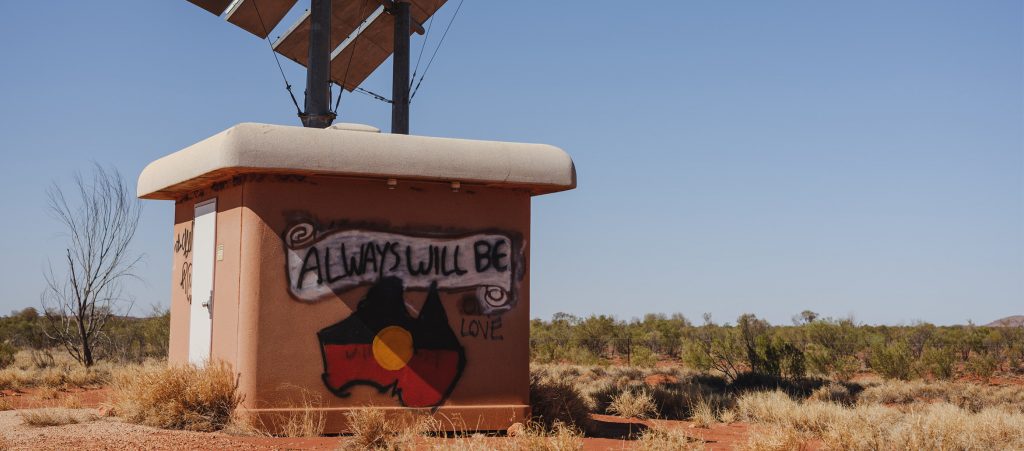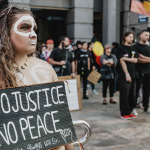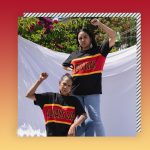
Every year, the same ‘debate’ about whether we should be celebrating a national holiday on January 26. Before you wade into that conversation with friends and family over the coming days (and we encourage you to do so), make sure you understand the Aboriginal perspective. Scroll for the links to insightful articles and opinion pieces from prominent First Nations writers about why the holiday needs to be changed or abolished.
There’s also a chapter in How to Win Every Argument that outlines both sides of the argument – you can buy a copy here.
Experiencing Survival Day
The day I don’t feel Australian? That would be Australia Day by Dr Chelsea Watego for The Conversation
“Australia Day celebrations to me feel a bit like what ANZAC Day would be without a dawn service. It just doesn’t feel right or honourable to those that have gone before us. The iconic Australia Day images of people adorning various flag paraphernalia, parades, boozy BBQs, and bikini-clad girls on beaches shows complete disregard for the Indigenous lives, lands and languages that were lost as a result of the British invasion of this country and the persisting inequalities that exist.”
The onus is no longer on Indigenous Australia. Come and rise to change the nation by Nessa Turnbull-Roberts for The Guardian
“My people have the right to start the healing process of what white Australia has subjected us to; however, this is becoming far from possible when Australia’s broken system continues to deny Indigenous Australia. More importantly it becomes obvious when the apparent “leadership” announces spending more funds on celebrating the re-enactment of Cook’s invasion for the 250th anniversary and suspending funds from Aboriginal legal services. My father would say, when you deny the past, you are denying the present, and from denying the present you are harming the future. The only people denying this truth is the oppressor refusing to spark truth.”
OPINION: Why I would rather escape Australia Day than fight it by Jack Latimore for NITV
“The occupants climbed out, each of them decked out in Australian flag apparel, singlets, boards, thongs, some accessorised with a hat, or earrings. And draped over their pointy shoulders were the obligatory Australian flag capes. They were all twenty-somethings, white and visibly drunk. I minded my own business, attempted to quietly continue on my way, but the opportunity was too overwhelming for them. A flag was thrust in my face, followed by gibes and drunken hooting. Of course this wasn’t the first time I’ve experienced this kind of intrusive behaviour on January 26, it was merely just the latest.”
Problems with Changing the Date
Perspective: Why I think Australia Day should be abolished by Tameeka Tighe for Triple J Hack
“As a Black woman in this country, it is hard to demand that my Black life should matter when for 233 years it never has. Protesting Australia Day is an anti-colonial movement, a movement that calls for our country to exist independently, with treaties acknowledging the Sovereignty of First Nations peoples; and completely separate from the British Empire. We cannot continue to overlook the gruesome invasion by the British Empire and the disregard for Black life throughout its illegal occupation to date.”
No matter which day the country chooses to host its Australia Day, I will not be participating by Nayuka Gorrie for NITV
“However, where I stop agreeing with the Change The Date sentiment and campaign is the need to celebrate at all… Your Australia could only happen on the back of Indigenous peoples. This is a history that this country has not reconciled with. There has been no nationwide truth-telling, no reparations, and very little shift of power to elevate Aboriginal and Torres Strait Islander peoples.”
A change of date will do nothing to shake Australia from its colonial-settler triumphalism by Tony Birch for IndigenousX
“I would assume that those campaigning to change the date would argue that such a move would be indicative of a “gesture of inclusion” or “one step towards reconciliation and healing”. Such is the rhetoric of symbolic gestures in settler-colonial societies incapable of countenancing either the relinquishment of power, or the contemplation of genuine remorse…
Additional questions must be raised about the morality of any proposed national celebration, whether it be held on January 26, Don Bradman’s birthday, or at four in the afternoon on the third Friday of September.”
Related Posts
From Celebration to Commemoration
We Need To Recognise January 26 As A Day Of Mourning by Senator Lidia Thorpe for Junkee
“For some, it’s about changing the date, changing the anthem, or even a moment’s silence. These changes are a step in the right direction, but why stop there? We need to change the nation. For the last two years I’ve led a dawn service on January 26 to mark a day of mourning, and honour all the Aboriginal men, women and children massacred upon invasion of our country. The vast majority of people standing with us have been non-Indigenous Australians, sharing our grief in a spirit of healing. These numbers grow each year.”
Reframing the Date: Jack Latimore on Our Nation’s Annual Argument by Jack Revell for The Latch
“‘As long as people are celebrating on the day and it becomes a little bit more solemn, a little bit more reflective, like Good Friday, then I think that that’s okay… There’s been a few things and the one that I think is resonating with people is ‘not a day to celebrate’.’
Perhaps we don’t need government intervention, something that, given the ongoing and appalling treatment of Indigenous people at the hands of police, along with our shocking Indigenous incarceration figures and all manner of other sins, might be akin to sticking a plaster on an amputation. Australia, taken as the sum total of its inhabitants, appears to be changing the meaning of the date all by itself.”
OPINION: Invasion Day, Survival Day, or Day of Mourning? All of the above by Luke Pearson for NITV
“January the 26th will always be an important date in our national calendar. It will always be Invasion Day. It will always be Survival Day. It will always be a Day of Mourning. We will never forget what this day represents. The only name I think the 26th of January should not have is ‘Australia Day’.
It is not a day that was ever intended for Aboriginal people to celebrate. Even as far back as 1888, when Henry Parkes was the Premier of New South Wales and was preparing to celebrate the 100 year anniversary, he was asked if he was planning anything for Aboriginal people on this day, to which he replied: ‘And remind them that we have robbed them?'”
Asking Bigger Questions
Symbolic recognition not the way forward By Gemma McKinnon for National Indigenous Times
“Australian governments have become comfortable with the idea of symbolic forms of Reconciliation. We have endured years of lemon myrtle-dusted morning teas, flag raisings, and screenings of Rabbit Proof Fence, yet institutionalised racism prevails everywhere I look.
The idea that First Nations people deserve a constitutionally enshrined role in our political system is deemed repugnant by the political elite like Turnbull and Wyatt. Symbolism has got us nowhere.”
DAY BREAK: Remembering as an act of resistance by Amy McQuire for Presence Substack
“But Aboriginal and Torres Strait Islander children begin their acts of resistance at very young ages… First Nations children are constantly thinking, learning and weighing up what they are taught with their own experiences. They hear different narratives of history from their elders, and they are actively decolonising in their own ways. By their very presence on what is stolen black land, they offer up a counter-narrative to the mythology of Australian history that was about removing us from this land; displacing us to make way for a white settler-colony.”
Reform: Pay the Rent by Nat Cromb for IndigenousX
“Instead we need to examine what we can, which is the value of the land stolen and the revenue derived from the land plus a monetary acknowledgement of the pain and suffering endured throughout the abhorrent acts perpetrated against First Nations people.
…[It] would need to consider the land value (which is currently estimated in the trillions), the wealth derived from the land and there would need to be a calculation that factored in the number of years that Australia has benefited from use of the land. The natural resources that have been sold also need to be factored in.
Perhaps the most important component for First Nations people is the damages for massacres, rapes, child removal, slave labour, trans-generational trauma and environmental damage.
A rudimentary example of the premise of this economic rationalisation would be:
Land + earnings from mineral resources + (interest x 231 years) + non-economic loss.”







